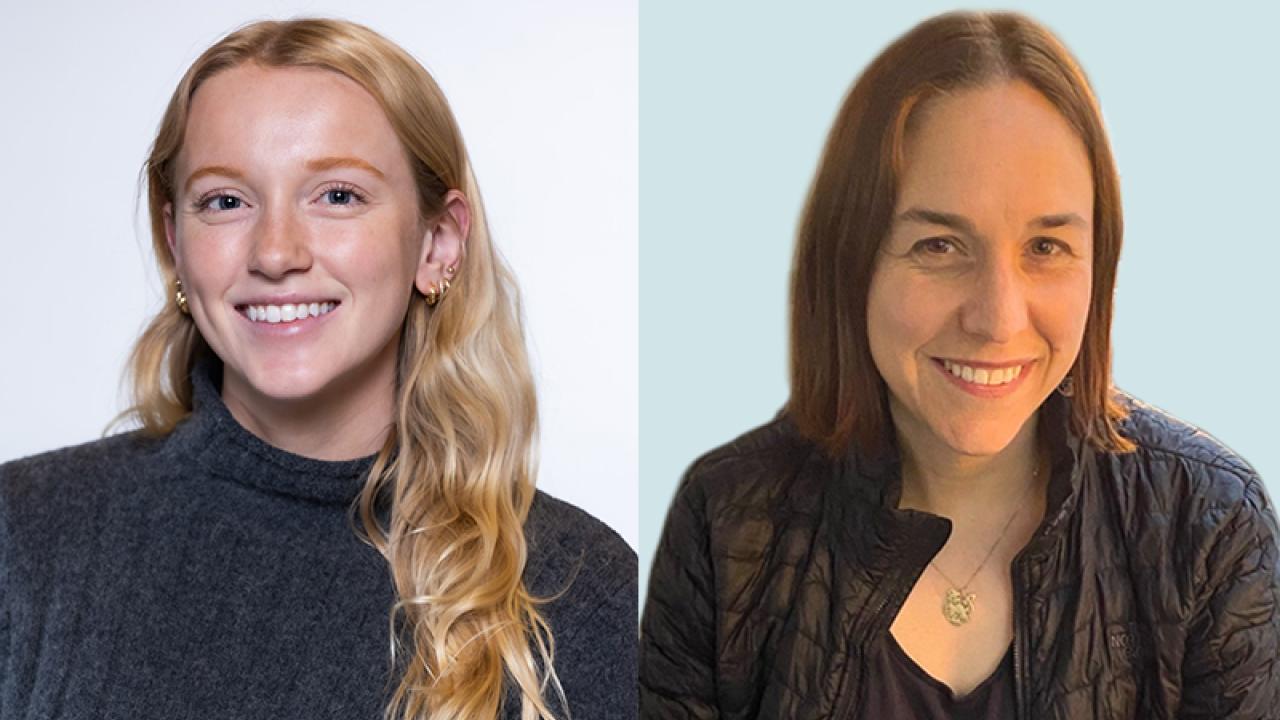
Left to right: Leah Loftus, clinical research coordinator in Thoracic Oncology and Sarcoma, and Laurel Brechtel, clinical research manager in the Cancer Immunotherapy Program
Earlier this year, the Helen Diller Family Comprehensive Cancer Center launched the Clinical Research Service Excellence Awards, a program recognizing exceptional contributions by campus staff working in oncology clinical research. Offered annually, the awards honor individuals who demonstrate excellence in clinical research and foster a positive work environment among the greater UCSF cancer community, including research participants.
Following a nomination process, two awards were bestowed in the program's inaugural year. Leah Loftus, a clinical research coordinator in Thoracic Oncology and Sarcoma, was named Clinical Research Coordinator (CRC) of the Year, and Laurel Brechtel, a clinical research manager in the Cancer Immunotherapy Program, was named Clinical Research Personnel of the Year.
Below, Leah and Laurel share their insights and experiences working in the dynamic field of oncology clinical research.
Q: Please tell us about your job in a few sentences. What do you do, and what does a typical day look like?
Leah: As a CRC, I assist our doctors with enrolling patients in clinical trials and following the trial protocol for treatment and procedure scheduling. A typical day consists of planning and coordinating patient visits, data entry and filing, and administrative tasks to keep our studies open and IRB-approved.
Laurel: I manage a team of 20 split between Mission Bay and Parnassus. We enroll patients to phase 1, first in human, and high acuity immunotherapies and cellular therapies. I split my week between the two campuses, and I love that no two days are the same. An example day would include: getting a pipeline trial ready for a Site Initiation Visit (SIV), helping sort out a complicated protocol amendment with the research pharmacist and budget analyst, a 1:1 with a direct report, and prepping a training for team meeting.
Q: How did you get started working in oncology clinical research?
Leah: I graduated from UC Santa Barbara in 2023 and sought an oncology CRC position because I am applying to medical school, and oncology is a clinical interest of mine. I accepted an offer with Thoracic/Sarcoma and have enjoyed working with our team and learning about oncology treatment.
Laurel: I began as a clinical research coordinator first working with people with schizophrenia, and then methamphetamine addiction. I made the jump to oncology as I knew I could provide kindness, humor, and support to cancer patients as they navigated their treatment journey. I feel honored to connect with people who volunteer to turn their lived experience into data.
Q: What do you find most rewarding about this work?
Leah: As a CRC, I am uniquely situated to know my patients on a personal level and advocate for them. I take any opportunity possible to minimize financial and logistical burdens for my patients through collaborative scheduling and reimbursement. Alleviating these stresses is rewarding because it shows a patient that they have someone looking out for them on the logistical side, while their doctor manages the clinical side.
Laurel: Our data comes from patients' complex lives, complicated hospital systems, and a constantly changing scientific landscape. It’s rewarding that every day I get to think on my feet, support my team, and have my actions, in the aggregate, contribute to the scientific landscape.
Q: In addition to recognizing a sustained commitment to excellence, this award honors clinical research staff who foster a positive work environment across the cancer center. How important is collaboration to your work? What are some ways that you try to have a positive impact on your colleagues?
Leah: Collaboration is essential to being a CRC because there is so much information to learn and share. My colleagues are the first people I go to for help, and I emphasize that I want to be that person for them as well. I check in with my colleagues regularly to discuss stresses and successes; this role is fast paced and it feels good to debrief together. We also like doing the NYT games as a group!
Laurel: I see it as a key part of my role as a Clinical Research Manager to foster positive and efficient relationships with all the groups we engage with, both internal and external to UCSF. I want CRCs and research participants to move smoothly through their days, and never to be treated as someone disrupting "usual" workflows. I assume that everyone is here do to their best work and approach discussions from that angle.
I try to ensure that training is engaging, hands on, and thorough, and that resources like the staff wiki are up to date. If instructions aren’t clear, available, or accurate, we can’t expect people to magically remember all the details.
Q: What is something (personal or professional) that you’re looking forward to in the coming year?
Leah: I am looking forward to attending lots of concerts later this year – Outside Lands, Crssd San Diego, Men I Trust, Steve Miller Band, and more!
Laurel: I’m excited about the changing immunotherapy landscape, especially in vivo chimeric antigen receptor (CAR) engineering. I’m hoping to help the Cancer Immunotherapy Program bring this opportunity to UCSF patients in the coming year.